
These 15 Illustrations Explain How Differently People Understand ‘Being On Time’ In Different Countries
Punctuality is something that many people struggle to get to grips with, in a busy world full of distractions the temptation to leave things to the last minute can sometimes get the best of you.
However, as the great Albert Einstein said, time is relative. Turning up a few minutes late to a meeting might be considered as a hideous social faux pas in one country, but a perfectly normal and acceptable behavior in another.
But how do you know what you are dealing with? Handily, Mr. Gamez has the answers, having researched cultural peculiarities around punctuality and presented them in clear, easy-to-read infographics. So what are you waiting for? Scroll down below to check them out for yourself, and let us know what you think in the comments!
Image credits: MrGamez
In many respects, South Korea is a very ordered society. The influence of Confucian principles runs through every aspect of day-to-day living. Well, in theory, at least. Central to this is Kibun, the concept of saving face. As a result, confrontation is to be avoided at all costs and one way to avoid any unpleasantness is to be on time, all the time. And to be lax in this regard is to mark oneself out as a cad and a bounder.
Image credits: MrGamez
It is often said that Malaysia has a very loose attitude toward punctuality in both the personal and professional sphere. Talk to any expat who has spent time there and they might grumble in agreement. However, this is to overlook the oft-times chaotic traffic and malfunctioning public transport that many Malaysians have to deal with on a daily basis. So while there might be a liberal attitude toward time keeping, there might also be practical reasons underlying this.
Image credits: MrGamez
As is so often the case, the understanding of something thought to be universal in one part of the world differs in another. It doesn’t even have to be two countries at opposite ends of the globe. For example, it might be regarded as unusual in China if one were to show up on time for a casual appointment with friends. You wouldn’t want to be too late but 10 or 20 minutes after the appointed time is just fine.
Image credits: MrGamez
However, that kind of attitude just will not fly in Japan. Despite being famous for their high-rolling gamblers the Japanese just don’t gamble with time, where tardiness generally results in groveling and sincere expressions of deep regret. However, the modern world being what it is, young Japanese people may well be more comfortable with the remorseless global lowering of societal standards than older generations, and might not expect you to beat yourself up too badly should you be late.
Image credits: MrGamez
Ever hear the story about the man who showed up on time for a business meeting in Mexico? He was left waiting a while. The same thing happened when he went to meet for drinks later that day. No, it wasn’t because he hadn’t showered or was dressed like a scarecrow. It just so happens that while punctuality is expected of foreign visitors to Mexico, the hosts aren’t bound by the same convention. Don’t take it personally.
Image credits: MrGamez
There is probably not a nation on earth that doesn’t have a host of ill-fitting stereotypes associated with it. In the case of Germany, however, punctuality really does fit that bill. In fact, being on-time is a risky enough tactic as your hosts will probably already be there waiting, wondering how on earth you could be so foolish as to allow the possibility of some unforeseen circumstance delay you by so much as a second.
Image credits: MrGamez
Nigeria is a country not often associated with punctuality. With a population of over 180 million, such a sweeping generalization might be considered a touch unfair but reputations can be a hard thing to shake all the same. Issues with infrastructure and traffic can all take their toll on an earnest desire to be punctual and perhaps over time this leads to a slightly jaded and indifferent attitude to arriving on time. Patience, it seems, is the key.
Image credits: MrGamez
It has been said that in Brazil, there is a widespread tolerance for delays. For example, it is considered impolite to arrive on time for a social occasion. That is probably due to the fact that it is unlikely the hosts would even be ready to receive their guests! Having said that, if you are a visitor to the country and have an important business meeting, it’s probably best not to do as they do because, not being Brazilian, you haven’t earned the right to be on anything other than ‘English time’.
Image credits: MrGamez
Some countries don’t give timeliness a priority in their societies and Saudi Arabia appears to be one of them. It could be that the lack of importance attached to timeliness is as a result of their long history of desert living where punctuality doesn’t figure highly on the list of everyday priorities. It could be that it’s too damn hot to do anything at pace. Whatever the reason happens to be, don’t expect punctuality on the part of your hosts, don’t get upset by this and please, don’t start looking at your watch during a professional or social gathering. It is considered quite discourteous.
Image credits: MrGamez
When a government rolls out a public education campaign to promote punctuality and effective time management amongst the populace, you know that you’ve reached whatever the opposite of ‘peak punctuality’ is. By all accounts, Ghanaians are a very relaxed and accommodating people who reckon that if everyone is late then no one is late. After all, what can’t be done today can get done tomorrow. If you find that kind of attitude difficult to deal with, prepare to be annoyed. Otherwise, sit back and enjoy the ride.
Image credits: MrGamez
If you feel like you’ve won the jackpot at a very lucrative slot machine because a scheduled meeting in India started at the proposed time, then you’re quite entitled to feel so. This is because in India, people might just have a different idea of time altogether. The Indian novelist R.K Narayan once wrote that “In a country like ours, the preoccupation is with eternity, and little measures of time are hardly ever noticed”. Indeed, the Hindi word for yesterday and tomorrow is ‘kal’ so it’s fair to say that the concept of time differs slightly in India than it does in other parts of the world. To add to this, issues with traffic and infrastructure can also act as an impediment to timeliness. Still, it is appreciated if a guest is punctual. Just don’t expect that your host will always do the same.
Image credits: MrGamez
When looking at punctuality, we can distinguish between a number of types of people, one of which is the early-arrival who will be at the designated meeting place at least 10 minutes ahead of time. Safe to say that these poor souls would not fare well in Morocco. Punctuality is such a flexible concept here that it is often referred to simply as “Moroccan time’. One would assume that Moroccans are honored to have the 4th dimension appropriated into a term specifically relating to their country and culture but it’s unlikely that first-time business travelers will be quite as enamored. A personal appointment might take place anywhere from half an hour after the agreed upon time to some time the next day. We think you’d be better off spending that time here on MrGamez. The odds that you’d win are definitely more favorable than starting a meeting on time (or on the same day) in Morocco.
Image credits: MrGamez
When in Greece it is worth remembering that Greeks ‘pass’ the time as opposed to ‘use’ it. In other words, time is something to be enjoyed rather than fretted over. As such, it is not unusual to arrive 30 minutes later for a dinner party. However, this laxity does not extend to business meetings where visitors are expected to be on time. As you might have guessed, the same rule doesn’t always apply to your Greek hosts.
Image credits: MrGamez
A relatively little known nation until a certain film was released in 2006, Kazakhstan is a massive country that consists of more than 100 different ethnic groups. With such variety amongst its people, it’s difficult to attribute a single defining cultural trait that is common to them all. Regarding punctuality, whilst not exactly at German levels, expats who have spent time there generally consider Kazakh’s to be punctual when it comes to work and business. When it comes to social appointments, however, different rules can apply. The finest example of this can be seen at weddings where it is perfectly acceptable for the bride to arrive late.
Image credits: MrGamez
When doing business in Russia, it is important to be on time. To be otherwise is considered disrespectful. Negotiations can be lengthy and may try your patience so be prepared for the long slog. Ironically, although attitudes toward punctuality are changing, Russians won’t hold themselves to the same standards of timeliness that they expect from you so, again, patients can be key.
Here’s what people had to say about the cultural differences
As someone from Germany, all the other info sheets are giving me a hard time.. why would you set up a meeting and a time and then just..not show up??? What is that madness?
I am late 2-5 minutes for my first meeting in the morning quite often and appreciate it when people don't get mad because of it all the time. But even I think this is total madness.
Load More Replies...I run on Swedish time- never late, and if I'm early, I patiently wait to announce myself at the exact moment I was supposed to be there.
I can confirm this, being early is just as big faux pas as being late, in Sweden.
Load More Replies...I personally follow the Chinese model. 10 minutes is no big deal, more than that, you should at least acknowledge it. After a half-hour I'm geting exponentially upset.
As someone from Germany, all the other info sheets are giving me a hard time.. why would you set up a meeting and a time and then just..not show up??? What is that madness?
I am late 2-5 minutes for my first meeting in the morning quite often and appreciate it when people don't get mad because of it all the time. But even I think this is total madness.
Load More Replies...I run on Swedish time- never late, and if I'm early, I patiently wait to announce myself at the exact moment I was supposed to be there.
I can confirm this, being early is just as big faux pas as being late, in Sweden.
Load More Replies...I personally follow the Chinese model. 10 minutes is no big deal, more than that, you should at least acknowledge it. After a half-hour I'm geting exponentially upset.

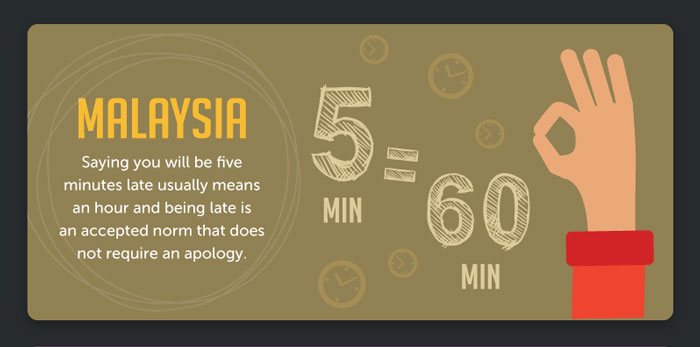


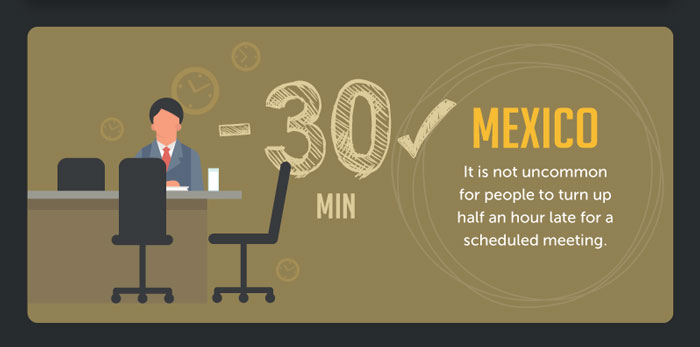

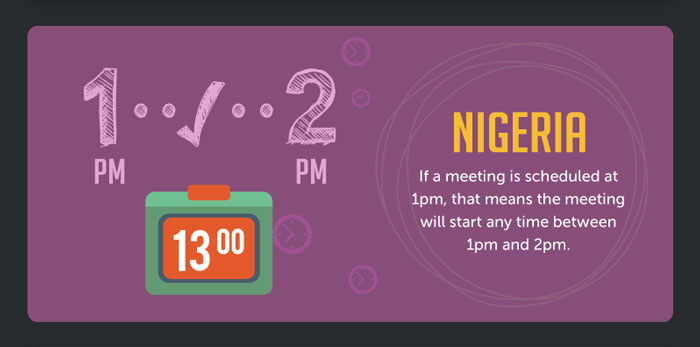
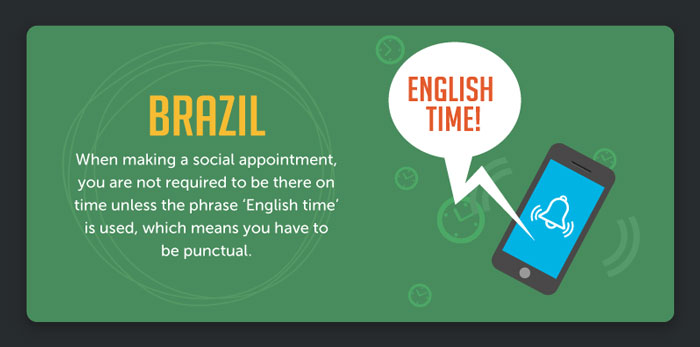
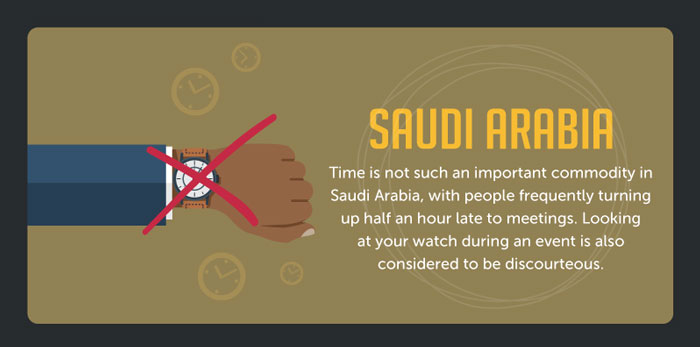


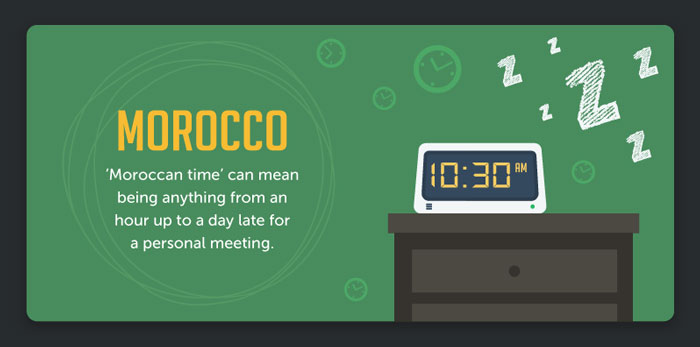
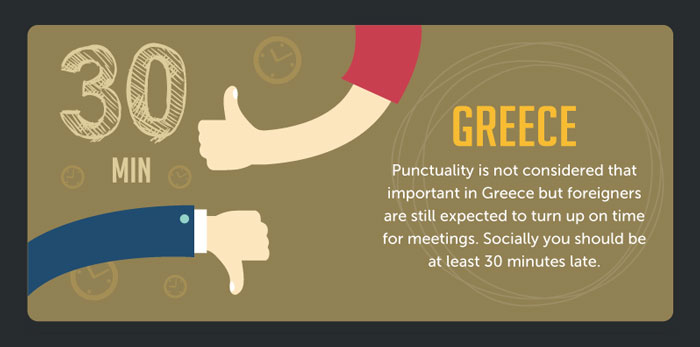
























224
127